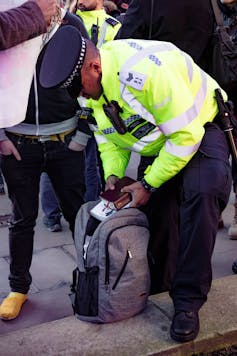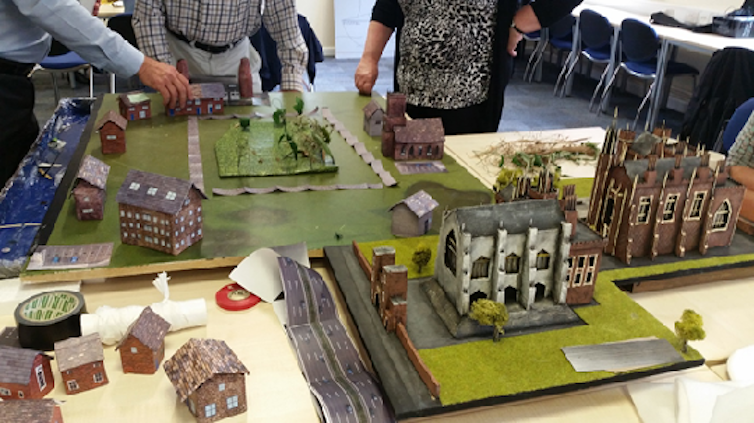Police won’t solve the knife crime epidemic – but community work can

Rawpixel.com Helen Millward, Keele University and Lindsay Hamilton, Keele University
Knife crime is a growing concern in England and Wales, with the UK government pledging an additional £100m to tackle what West Midlands Police have named a “national emergency”. Figures show that the number of knife crime incidents is rising. In England, there were 5,053 knife assaults recorded in 2017-18, an increase of 14% since 2016-17 and 39% higher than in 2014-15. Just over one in five knife offenders are between the ages of ten and 17.
Recent media focus has suggested that budgetary cuts and the fall in police officer numbers are to blame. Commentators also question the long-term efficacy of preventive methods such as police stop and search powers, mediation and test-purchasing of weapons in shops, ensuring only those 18 or older are able to buy weapons.
Worryingly, research points to a close correlation between knife crime and a raft of social problems such as poverty, school exclusions, ill mental health and rising numbers of children with complex needs and vulnerabilities. But it is hard to say how these factors relate to each other and whether they cause – or are caused by – knife crime.
The recent increase in budget to tackle knife crime indicates that the issue is being taken seriously by the government. For example, £1.5m has been earmarked for activities such as purchasing new police cars and hand-held metal detectors, gaining new staff and mentoring programmes.

But stop and search and test-purchasing of weapons cannot address the complicated social problems that are linked to knife crime. Stop and search powers do not help to positively change an area’s culture, for example. They can alienate community members and can foster feelings of mistrust and division within communities already divided by offending and anti-social behaviour.
Those living within communities where there are problems are often those best placed to understand what is going on and why. Police understand that outreach is an effective way of getting to know community members and hearing their concerns. For example, in the West Midlands, £100,000 of funding is to be given to young people to help them improve their communities “via local initiatives”. This isn’t a very large amount of funding: police budgets for outreach are under pressure and the majority of police powers only equip officers to deal with knife crime after the fact, rather than focusing on prevention.
The power of community
Community outreach involves community members coming together in attempts to tackle a shared problem, typically an issue affecting the community’s local area. Community outreach groups can work in partnership with other organisations, which can often be helpful in gaining funding to further the impact of activities.
For example, a community outreach group that wants to address food poverty in their community may want to work with a local food bank, food store or university. Community outreach sees residents as a part of the solution to social problems and encourages proactive behaviour, rather than passively waiting for issues to be solved by, for example, the police or government departments.
Our research explores new techniques of community outreach undertaken in partnership with a local theatre in a deprived area of the West Midlands, UK. Here the police were not leading the workshops: instead they were facilitated by theatre practitioners. A variety of creative methods, including poetry, craft and drama, helped to tailor activities to those in attendance.

We attended the workshops and participated with the aim of gaining an understanding of the issues facing the local area, as seen by community members themselves. The creative methods used at the workshops helped us to understand a variety of issues such as local crime, to get to know those affected and to build better relations between community members. Longer term, the aim was to kindle trust, reduce fear and tackle some of the underlying social disadvantages which can lead to offending.
At the heart of these workshops is the concept of co-creation and its core principle of social equality. The practical effect of this is to remove issues of hierarchy and promote discussion between practitioners, academics and community members.
During the workshops all participate in planning and choosing approaches and feel equal ownership of the process. Nobody is the “expert”. The activities are “fun” - usually organised around a practical process such as craft - and serious issues only emerge when participants feel they should. These are not focus groups and because of that, we have noted little tension or confrontation. Instead, we think that reflections and ideas develop naturally. As one theatre practitioner noted:
The project was about personal choice and how things from the past don’t have to haunt you, and you can change it … so you just have to be conscious make the right choice next time.

Changing hearts and minds
Results have been positive, with particular success in supporting new social networks and connections. One elderly lady who participated in an outreach workshop said that she was initially quite wary of young offenders within the community, for example, but this changed when she met some of the people in question at a workshop. She realised they were not “thuggish, they were just kids”.
The degree of reflection was also noted among ex-offenders. Some even came forward to volunteer at the theatre after the project finished. Practitioners realised that some of the ex-offenders had gained “the confidence to go back into education” or to feel “confident enough to apply for a job and start working”. This suggests that these people are less likely to offend again and are increasing their capacity to make positive social and cultural contributions.
There is also potential for these changes in attitude to generate community-wide impact because, as one of the workshop leaders explained:
If you change one individual and they get the opportunity to change another individual then it spreads throughout their group … slowly you spread the word, whole group change is quite a big thing.
These results are promising within the context of knife crime, particularly as it seems increasingly out of police control. At the very least, our work shows that community outreach can make a positive contribution to tackling local issues. But further government funding would significantly benefit the impact of such creative work. This would improve the ability of communities themselves to address issues such as knife crime in their local areas, rather than relying on the methods of those who may have little understanding of the best placed solutions to fit the local area.![]()
Helen Millward, Teaching Fellow in Marketing, Keele University and Lindsay Hamilton, Senior Lecturer in Organisational Ethnography, Keele University
This article is republished from The Conversation under a Creative Commons license. Read the original article.
Most read
Contact us
Andy Cain,
Media Relations Manager
+44 1782 733857
Abby Swift,
Senior Communications Officer
+44 1782 734925
Adam Blakeman,
Press Officer
+44 7775 033274
Ashleigh Williams,
Senior Internal Communications Officer
Strategic Communications and Brand news@keele.ac.uk.


